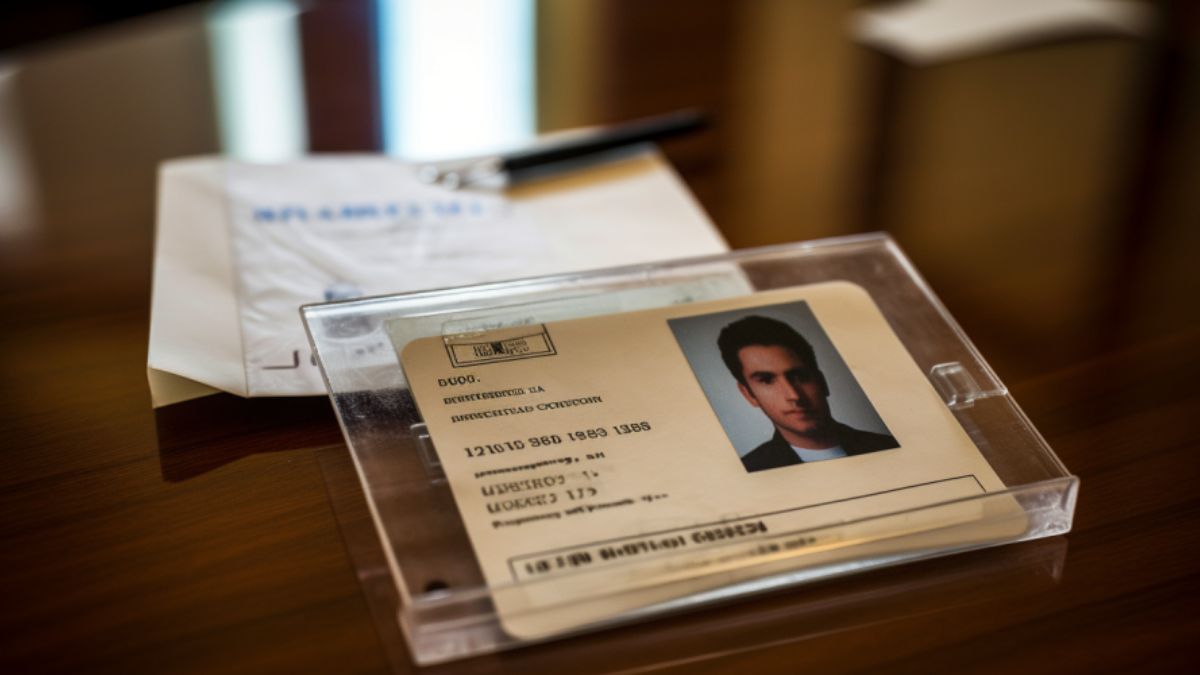Can You Use A Fake Id At A Hotel? Will It Work & What Happens If You Get Caught?

As participants in Amazon Associates and other programs, we earn from qualifying purchases. This comes at no additional cost to you. For more details, see our Affiliate Disclosure.
In a world increasingly reliant on stringent identification protocols, some individuals may contemplate the use of falsified identification documents, even when it comes to seemingly mundane transactions such as booking a hotel room. With laws and regulations around identification being varied and complex, it’s essential to understand the ins and outs of using a fake ID in the context of hotel check-ins.
This article explores the feasibility and implications of such actions, assessing the potential risks, consequences, and the overarching legality surrounding the use of fake IDs at hotels. The focus here is not to promote illegal activity, but to shed light on the potential repercussions, making it abundantly clear why this is a path better left untraveled.
The Role of Identification in Hotel Check-ins
Identification is a fundamental requirement during hotel check-ins, serving multiple purposes ranging from security measures to legal compliance. Let’s delve into the role of identification in hotel check-ins and why it’s essential.
- Age Verification: Some hotels have age restrictions for booking rooms. For instance, in many regions, you must be at least 18 or 21 years old to reserve a room. By checking identification, the hotel can verify your age, ensuring they comply with the law and their policies.
- Security: Identification helps hotels ensure the safety and security of their guests and staff. By knowing who is staying at their property, hotels can minimize the risk of unlawful activities. If a problem arises during a guest’s stay, the hotel will have the necessary information to handle the situation.
- Billing Purposes: Identification also plays a crucial role in the hotel’s billing process. A hotel uses the information on your ID to match with your payment information, helping to prevent credit card fraud and other financial discrepancies.
- Legal Compliance: Hotels are legally obligated to maintain records of their guests, including their identities. These records may need to be produced for law enforcement or other authorities upon request.
- Preventing Fraud: By asking for ID, hotels can prevent identity fraud. This is essential not only for the safety of other guests but also for protecting individuals whose identities may have been stolen.
Identification is a crucial component of the hotel check-in process, reinforcing both the security and functionality of the hotel’s operations. It’s a preventative measure against fraudulent activities and a means of ensuring guest accountability, which ultimately contributes to a safer and more secure hospitality environment.
Can You Use a Fake ID at a Hotel: The Feasibility Factor
While the use of a fake ID at a hotel may initially seem feasible to some, in reality, it is fraught with numerous hurdles and risks, making it a highly inadvisable action.
- Technology and Expertise: Hotels, particularly larger chains, often use sophisticated systems to check and validate identification documents. These systems can detect discrepancies that a human might miss, significantly increasing the likelihood of a fake ID being spotted. Moreover, hotel staff are often trained to identify fraudulent identification documents, making it difficult for a fake ID to pass muster.
- Legal Considerations: Using a fake ID is illegal in most jurisdictions. Even if you manage to trick the hotel’s identification verification system, you are still breaking the law, and this carries significant consequences. The hotel may not notice, but if law enforcement becomes involved, you could find yourself in serious trouble.
- Unpredictable Outcomes: The use of a fake ID opens up a host of unpredictable outcomes. What if the hotel decides to verify your identification details due to any reason – perhaps a large booking, or random security checks? Any inconsistency would immediately raise red flags, leading to potential legal repercussions.
- Long-term Implications: Even if you were to successfully use a fake ID to check into a hotel, there could be long-term implications. For instance, if any issues arise from your stay (such as unpaid bills, property damage, or legal complaints), these would be linked to the false identity, and trying to extricate yourself from these issues could prove incredibly difficult and legally complex.
While it might seem feasible on the surface to use a fake ID at a hotel, the risk, potential consequences, and the inherent illegality make it an extremely unwise decision. Not only could you face immediate repercussions, but there are also potential long-term implications that could affect your life for many years to come.
Potential Consequences if You’re Caught Using a Fake ID at a Hotel
The potential consequences of being caught using a fake ID at a hotel are severe and wide-ranging, extending far beyond a simple slap on the wrist. Here’s an overview of the penalties you could face if caught in such an act:
- Immediate Refusal of Service: At the very least, you can expect to be denied service if you’re caught trying to use a fake ID at a hotel. The establishment has the right to refuse your booking, and you may even be asked to leave the premises.
- Reporting to the Authorities: Hotels are obliged to report fraudulent activity, including the use of fake IDs, to local law enforcement. If your actions are reported, you may find yourself facing legal trouble.
- Criminal Charges: In many jurisdictions, using a fake ID is a serious crime. Penalties vary but could include fines, community service, probation, and even imprisonment in some cases. Charges can range from misdemeanor offenses to felonies, depending on your location and the specifics of the situation.
- Permanent Record: If you’re convicted of using a fake ID, this could end up on your permanent record. A criminal record can negatively impact your life in various ways, including difficulty finding employment, potential issues with future educational opportunities, and even trouble securing housing.
- Damage to Reputation: Beyond the legal consequences, being caught using a fake ID could have serious implications for your personal and professional reputation. Word may spread about your actions, which could result in social embarrassment and potential professional repercussions.
- International Travel Implications: If you’re traveling internationally and get caught using a fake ID, the consequences can be even more severe. You could face deportation, be barred from re-entry into the country, or even be arrested and charged under the country’s local laws.
These potential consequences underscore why using a fake ID at a hotel is a risky and ill-advised decision. It’s not just about potentially embarrassing yourself or being denied service – it’s about the real, lasting legal implications that could affect your future for years to come.
The Legal Implications of Using a Fake ID: It’s Not Just About the Hotel
The use of a fake ID, whether in a hotel or elsewhere, carries with it serious legal implications. Regardless of the motives behind such actions, false identification is widely considered a breach of the law and is dealt with accordingly. Here’s a breakdown of how legal systems perceive and handle these situations:
- Identity Fraud: Using a fake ID typically falls under the umbrella of identity fraud, which is a criminal act in most jurisdictions. This could entail pretending to be someone else or misrepresenting your own details. Penalties for identity fraud can be severe, including hefty fines and imprisonment.
- Forgery: Depending on the specifics of the situation and local laws, using a fake ID might also constitute forgery, another serious crime. If your fake ID is seen as an attempt to forge official government documentation, you could face additional charges.
- Deception and Fraudulent Behavior: In some jurisdictions, using a fake ID can be considered a form of deceptive or fraudulent behavior, which is also punishable by law. This is particularly true if you use the fake ID to deceive the hotel for financial gain, such as securing a room at a lower rate.
- Legal Repercussions Beyond Borders: If you’re caught using a fake ID in a foreign country, you’re subject to the laws of that country, which might be much stricter than your home country. It could lead to deportation, or worse, imprisonment in a foreign land.
- Long-Term Impact: A conviction related to using a fake ID can result in a criminal record, which has long-term impacts on your life. It could affect your chances of getting a job, applying for credit, seeking higher education, and even limit housing opportunities. In some cases, it might affect your right to vote or stand for public office.
The legal implications of using a fake ID extend far beyond the hotel lobby. They can have severe and lasting impacts on your life. It’s crucial to understand the gravity of these consequences, which underscore the importance of using legitimate identification in all aspects of life, including hotel check-ins.
Why the Risk Doesn’t Outweigh the Reward: An In-depth Analysis
One might imagine that using a fake ID at a hotel could offer some perceived benefits—perhaps the thrill of deception, bypassing age restrictions, or avoiding personal detection for various reasons. However, upon closer examination, these ‘benefits’ are largely superficial and are far outweighed by the potentially severe consequences.
From a legal standpoint, the risks are substantial. As previously discussed, the use of a fake ID can lead to serious charges such as identity fraud and forgery, both of which can result in significant fines and imprisonment. The repercussions don’t end with the sentence; these actions can result in a permanent criminal record, leading to long-term implications for future employment, education, housing, and even travel opportunities.
From a practical perspective, the success rate of using a fake ID, especially in reputable hotels with stringent checks, is extremely low. Hotels are increasingly employing sophisticated technologies to verify identities, and staff are often well-trained in spotting fake IDs. The chance of being caught is high, and once caught, the immediate implications, such as being denied a room or being reported to the police, can be daunting.
In the social context, the use of a fake ID can have dire implications for personal and professional reputations. Once trust is broken, it’s hard to regain, and a tarnished reputation can have far-reaching effects on relationships, career prospects, and community standing.
Lastly, the psychological burden should not be underestimated. The constant fear of being caught, dealing with guilt, and living with the potential consequences can cause significant emotional distress.
When weighing up these considerable risks against the questionable benefits, it’s clear that using a fake ID at a hotel isn’t just a poor decision; it’s a dangerous gamble. It’s a path that promises more trouble than it’s worth, littered with legal dangers, personal perils, and long-lasting consequences. Instead, adhering to the law and resorting to legitimate means for hotel check-ins is the safer, wiser, and ultimately more rewarding route.
Better Alternatives to Using a Fake ID: Safe and Legal Solutions
Resorting to using a fake ID at a hotel is not a viable or legal solution, regardless of the issue at hand. There are numerous safe and legal alternatives to consider if you’re facing difficulties related to identification during hotel check-ins:
1. Accompanied by an Adult: If you’re under the required age to book a hotel room, consider traveling with an adult who can book the room on your behalf. This approach is both legal and commonly accepted at most hotels.
2. Look for Age-Friendly Accommodations: Some hotels, hostels, and bed-and-breakfast establishments are more lenient with their age restrictions. Research to find establishments that cater to younger guests or have more flexible policies.
3. Use Verified Online Booking Platforms: Online booking platforms like Airbnb often have different policies and may be less strict than traditional hotels. However, it’s crucial to read and understand the terms and conditions before booking.
4. Get a Legal ID: If your problem is a lack of identification, take steps to obtain legitimate ID. Many countries offer different forms of identification that may be suitable, such as driving licenses, passports, and government-issued ID cards.
5. Establish Credit: If the issue is a lack of a credit card, which is often needed for hotel bookings, consider applying for a debit card or secured credit card. Alternatively, some hotels may accept cash deposits or pre-paid cards.
6. Reach Out to the Hotel: If you’re facing difficulties, consider contacting the hotel directly. They may be able to help you with alternatives, like allowing a parent to book on your behalf, or accepting a different form of payment.
Remember, the potential consequences of using a fake ID far outweigh any perceived benefits. Resorting to legal and safe alternatives will ensure that your stay is stress-free and within the boundaries of the law.
Lessons Learned: The Ultimate Takeaways on Using a Fake ID at Hotels
The exploration of the use of fake IDs at hotels reveals numerous critical lessons about the nature of legality, risk, and personal responsibility. Above all else, it reaffirms the principle that actions, particularly those that skirt the law, carry consequences—often severe and long-lasting.
The most fundamental takeaway is the understanding that using a fake ID, in a hotel setting or otherwise, is illegal. This illegality isn’t merely a rule on paper; it’s enforced and can result in serious repercussions, including hefty fines, imprisonment, and a permanent criminal record. Recognizing the gravity of these consequences is paramount in making informed decisions regarding identification usage.
Secondly, it’s clear that the risk associated with using a fake ID does not outweigh any perceived rewards. Whether one is attempting to bypass age restrictions, evade detection, or exploit financial benefits, the potential gains are vastly overshadowed by the legal, personal, and social dangers involved. The risk is simply too high for the reward to be of any worthwhile consideration.
Additionally, it’s important to note that the use of fake IDs is not just a matter of legal and personal ramifications; it’s also a question of ethics and integrity. Misrepresenting oneself is fundamentally dishonest and can damage one’s reputation beyond repair. Trust, once lost, is challenging to regain.
Finally, there is the positive realization that there are legitimate, legal alternatives for those facing obstacles related to hotel reservations and check-ins. By seeking out appropriate solutions and adhering to the rules, it’s possible to navigate these difficulties without resorting to illicit methods.
In sum, the exploration of the use of fake IDs at hotels serves as a potent reminder of the importance of abiding by the law, the potential repercussions of illegal activities, and the value of integrity and honesty. These lessons extend far beyond hotel check-ins, providing valuable insights applicable to various aspects of life.






